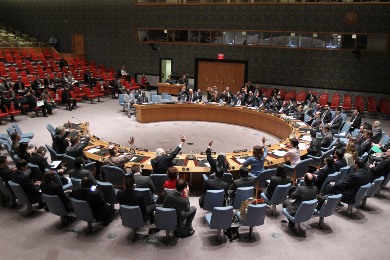Security Council threatens sanctions on South Sudan if peace deal not fully implemented
August 29, 2015 (NEW YORK) – The United Nations Security Council (UNSC) has on Friday, 28 August, tabled for adoption a strong worded statement by Council’s president, urging the parties to the peace deal in South Sudan to fully implement the agreement “without exception” or face arms embargo and sanctions targeting individuals seen to be obstructing the implementation of the accord.

President Kiir backed down reluctantly and signed the peace deal on 26 August, but with reservations.
It is not clear whether the Security Council, also scheduled to meet on 1 September, will discuss the reservations or complaints documented by President Kiir, or will simply ignore them and work for other measures to ensure that the signed peace document, which does not any way incorporate the reservations, is fully implemented during the transitional period.
Council members on 25 August had expressed concern in South Sudan consultations about the possibility of Kiir signing the agreement with reservations, and a document produced by the government of South Sudan identified several reservations to the agreement, including to provisions regarding the demilitarisation of Juba, the mechanisms to monitor the ceasefire and other security arrangements.
The presidential statement by the UN Security Council on Friday commended the decision made by president Kiir to sign the peace deal on 26 August, but said the world body will be closely monitoring its implementation and to keep the option of targeted sanctions on the table as continued pressure on parties to abide by the agreement.
The statement welcomes the signature of the agreement by all parties. It refers to the full implementation of the agreement, “as contained exclusively in the annex to S/2015/654 in full and without exception.”
On sanctions, the draft expressed the Council’s readiness to consider appropriate measures to ensure full implementation of the agreement, “including through the imposition of an arms embargo and additional targeted sanctions.”
Further, it took note of a press statement of the African Union (AU) Peace and Security Council (PSC), warning that all those undermining the lasting resolution of the conflict, including implementation of the agreement, would be held accountable for their actions.
During the negotiations of the draft resolution, some Council members had proposed that an arms embargo should be imposed even if president Kiir signed the agreement, but other Council members opposed this, given the positive development of the signing and to give president Kiir time to implement it.
Also on issues of accountability for the war crimes and crimes against humanity beginning from 15 December 2013, the Council seemed to be attaching it to the cooperation or non-cooperation of the parties to fully implement the deal, or whether bringing leaders to account would negatively impact on implementation of the agreement.
Observers say the Council will be forcing top leaders to cooperate in the full implementation of the peace deal and handing over their officials implicated in the African Union report, which is expected to be released.
The draft presidential statement also stated the Council’s intention to move swiftly to update the mandate of the United Nations Mission in South Sudan (UNMISS) which will play “expanded” role in provision of security during the transitional period.
The UNMISS mandate is expected to be renewed sooner before the 30 November deadline, and expanded so that the mission can focus on providing support for immediate tasks leading to a transitional government of government of national unity to be established in 90 days as per the agreement, as well as supporting planning for security arrangements.
(ST)
